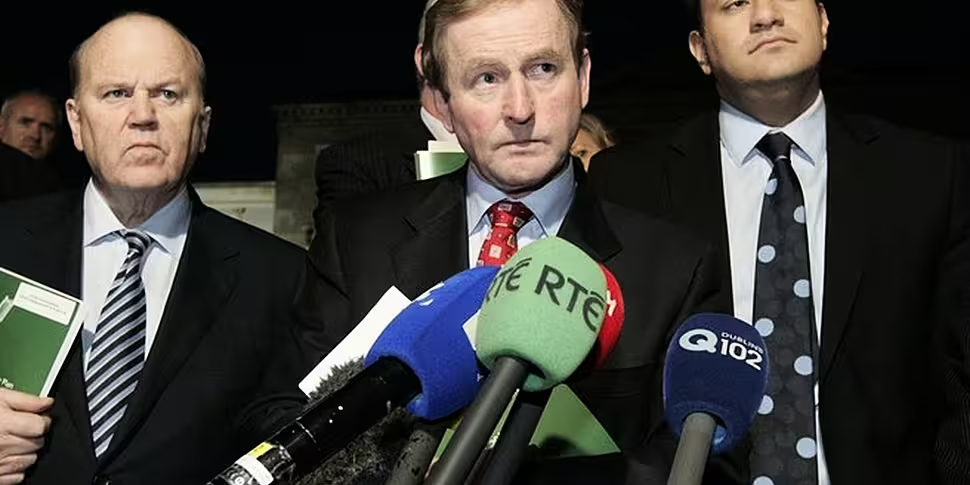The relatively calm and well-charted seas on which the good ship Ireland Inc has been sailing have become broad un-navigated expanses of open ocean, beset by troublesome storms and home to all sorts of strange marine creatures.
The change in the landscape, brought about the by the Brexit vote and President Trump’s likely corporate tax and protectionist policies, has been sudden, shocking and perhaps permanent.

So, how should our fragile vessel and those in charge of piloting her respond?
We need a range of responses, both tactical and strategic, short and longer term.
In the short term at a political level our government, agencies must do everything possible to keep the ship afloat and away from the most obvious dangerous currents and visible reefs.
In short, we must try to ensure through politics and diplomacy, the least harmful disentanglement of the UK from the EU and the least adverse view on Capitol Hill of Ireland’s perceived status as a quasi haven where US multinationals can lay up and avoid their fiscal responsibilities at home.

At a business and economic level, we need to do everything reasonable to maintain our competitiveness in key UK markets even in the face of adverse currency movements and possible penal tarrifs; and we must constantly highlight, the non-tax advantages we continue to offer US multinationals requiring a bridgehead within the EU, in addition to whatever benefits our corporate tax rate continues to offer.
This will not prove easy: and while we must fight the good fight with every political and competitive weapon we can utilise, we will inevitably suffer the impact of much stronger headwinds. These will blow us off course many times and/or make it more difficult, if not impossible, to reach former friendly ports ahead of competitors.
Therefore, we have no option but to begin immediate longer-term, strategic planning to cope with a much more hazardous journey for which we have some maps, but little experience.
We are not good at this kind of planning: We are not good at formulating and implementing the deliberate and at times radical decisions that won’t necessarily bear fruit in the short term, but that are essential for our longer-term survival.

But the sooner we realise that our existing economic and employment model is facing a fundamental generational threat, the sooner we can try to prepare for it. In that spirit, we set out below a short manifest, in no particular order of priority, of the types of decisions that fall within this category and within a target five-year delivery timeframe.
- Ensure all primary school children are spending appropriate time learning a continental European language. The EU, shorn of the UK, has to become a more important market for us now and we need to show even those who speak good English, we are serious Europeans and serious about trading with them.
- Match OECD-level funding for our third level institutions. If this means the doubling or trebling of fees, for those who can reasonably afford it, so be it (look at the wealth has been channeled into fee-paying secondary education because of politically-motivated, uneconomic third level charges).
- Incentivise, through aggressive use of the tax system or otherwise, the doubling of our GDP spend on research and development and innovation. We have got to become less dependent on imported technology and ideas. We also need to leverage our disproportionately high volumes of talented graduates, keep them at home, and allow them a reasonable ratio of failure.

- Put in place a range of measures to encourage high-growth potential SMEs to grow to the next level in Ireland under their broad Irish ownership.
- For those owners who want to exit, increase capital gains tax relief proportionately the longer they defer any such sale and continue to grow the business.
- Establish, through Enterprise Ireland, a panel of expert managers (Irish or non-Irish; active or retired), able to develop a high-growth potential Irish company to the next level, under existing or new Irish ownership.
- Expand DCU’s family business education model to enable the next generation to assume control of growing family businesses with at the appropriate time, and with the appropriate skill set.
- Streamline the planning system as a matter of urgency...Whether we continue to attract significant foreign capital or become more dependent on our own capital investment, we cannot sustain a process whereby a project such as Apple’s Athenry Data Centre is already under construction in Denmark and still being debated here.
The winds are blowing stronger, the sea is beginning to churn. We need new navigational equipment, new vision and some political courage.









